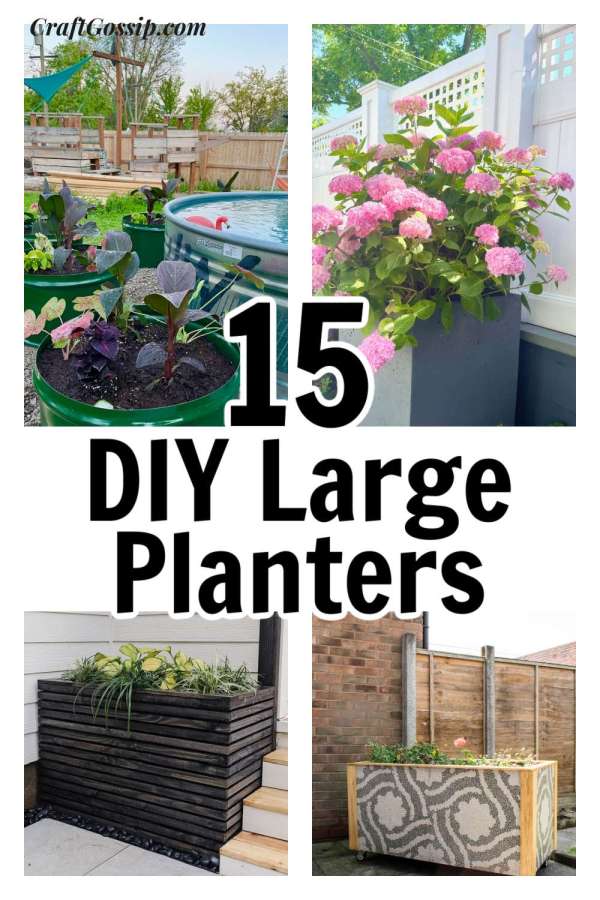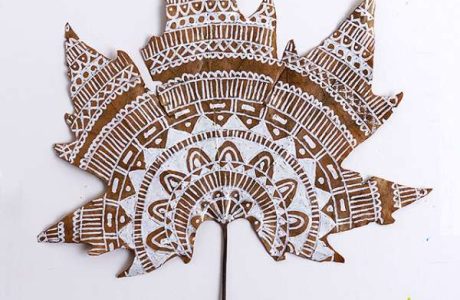
Get ready to super-size your gardening game with our collection of 15 DIY large planters that are not only a feast for the eyes but also a smart way to save your hard-earned green. These substantial planters are a testament to how creativity and resourcefulness can transform your garden and outdoor spaces while keeping your budget in check.
In this extraordinary roundup, we’re diving into the world of large DIY planters. These projects are not just about nurturing your green companions; they’re an ode to your ingenuity and practicality. Whether you’re cultivating a flourishing garden, creating a statement piece for your patio, or simply seeking to make a bold impact in your outdoor decor, these large planters are the thrifty gardener’s dream come true.
With these projects, you can create magnificent planters that make a substantial impression without breaking the bank. From repurposed materials to clever design hacks, you’ll find a wide range of cost-effective solutions that prove you don’t need to spend a fortune to elevate your garden’s aesthetics.
So, if you’re ready to embark on a journey of creativity, savings, and greenery, these 15 DIY large planters are your roadmap to a more vibrant, budget-savvy garden. Get ready to craft, cultivate, and experience the joy of gardening on a grand scale without emptying your wallet. It’s time to let your green oasis flourish while watching your savings grow!
DIY Large Slatted Planter Plans – Pine and Poplar
Rolling planter made from tiles
DIY Outdoor Planter — Mid Modern Mama
How To Make Concrete Planter: DIY Concrete Planter
https://www.instructables.com/Fast-Easy-Tile-Planter/
How to Make a Dyed Cement Planter – At Charlotte’s House
DIY Cinder Block Entryway Planter | Hometalk
DIY large concrete planters-How to make it in one weekend – Houzewize %
DIY Concrete Planter – Garrison Street Design Studio
This Saved Me $1200 || Making a Large Concrete Planter
How to Build a Raised Garden Bed on Concrete, Patio, or Hard Surface ~ Homestead and Chill
Mosaic Tile Window Box Planter | Centsational Style
DIY Planter Box with Hidden Storage
Building a Raised Planter Bed with a Trellis | DIY – Dalla Vita
Here are some more planter ideas in some previous articles
18 Concrete Planters To DIY For Your Home And Garden
17 Succulent Planters You Can DIY
One of the most FAQ we get is, How much soil will I need for my planter and can I cut costs somehow?
When creating larger planter boxes, the amount of soil needed can be substantial, and it’s beneficial to find ways to save on soil costs. Here are some strategies and tips to help you save on soil and even calculate how much you’ll need:
Filler Material: To reduce the amount of soil required, consider using filler material at the bottom of the planter. This can be items like empty plastic bottles, foam packaging peanuts, or even broken terra cotta pots. Place a layer of these materials at the bottom before adding the soil. This not only saves on soil but also improves drainage.
Adjust Planter Depth: Consider making shallower planters if possible. A smaller depth means less soil is needed. You can still grow many plants in shallower containers, especially those with compact root systems.
Use a Soil Calculator: Various online soil calculators can help you determine the volume of soil you need based on the dimensions of your planter. These calculators take into account the length, width, and depth of your planter to give you an accurate estimate.
Layered Approach: Use a layered approach to your planter’s soil. Instead of filling the entire planter with expensive potting mix, use a lower-cost filler material for the bottom third or half of the planter, and then fill the top portion with quality potting soil.
Mix Your Own Soil: Consider creating your potting mix by blending topsoil, compost, and other soil amendments. This can be cost-effective and allows you to customize the soil to your plant’s needs.
Bulk Purchasing: Buying soil in bulk quantities can be more cost-effective than purchasing multiple bags. Many garden centers offer bulk soil options.
Repurpose Soil: If you’re refreshing an existing planter, save and reuse as much of the old soil as possible. You can amend it with fresh potting mix or compost to rejuvenate its quality.
Compost: Incorporate compost into your soil mix. It not only improves soil quality but also increases the soil volume without a significant cost increase.
Choose Compact Plants: Select plant varieties that are naturally smaller or more compact in size. This will reduce the amount of soil needed to cover their root systems.
High-Volume Plants: Use plants with extensive root systems or root structures that don’t require a lot of soil. For example, some succulents and grasses fit this category.
By combining these strategies and calculating your soil needs accurately, you can save money and make your large planter projects more budget-friendly while ensuring your plants have the soil depth they require for healthy growth.



